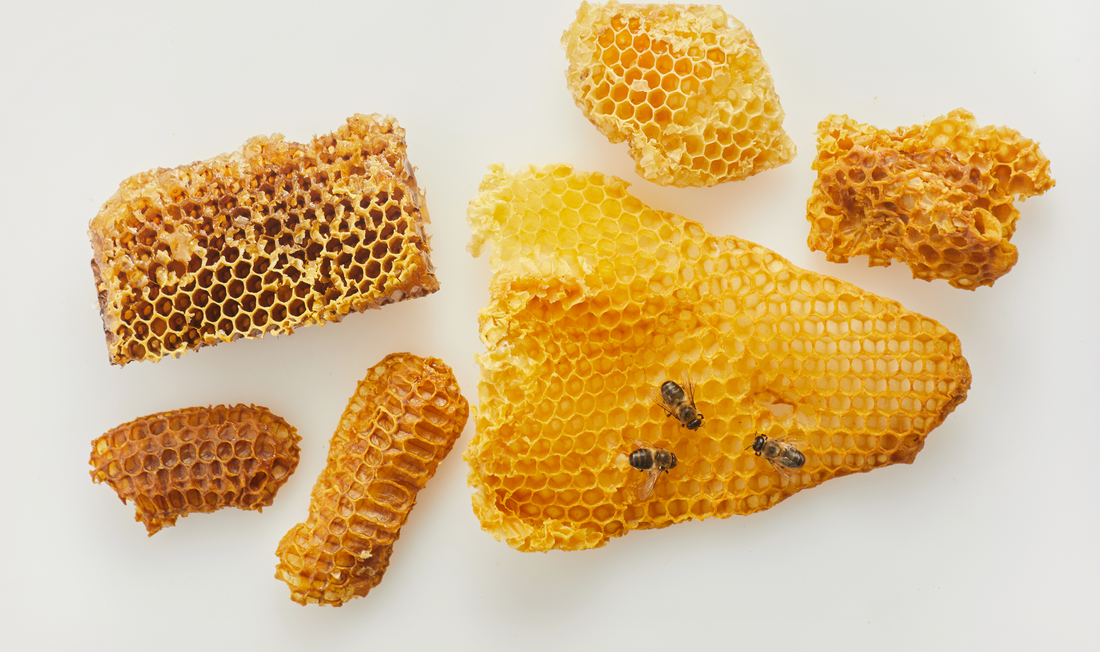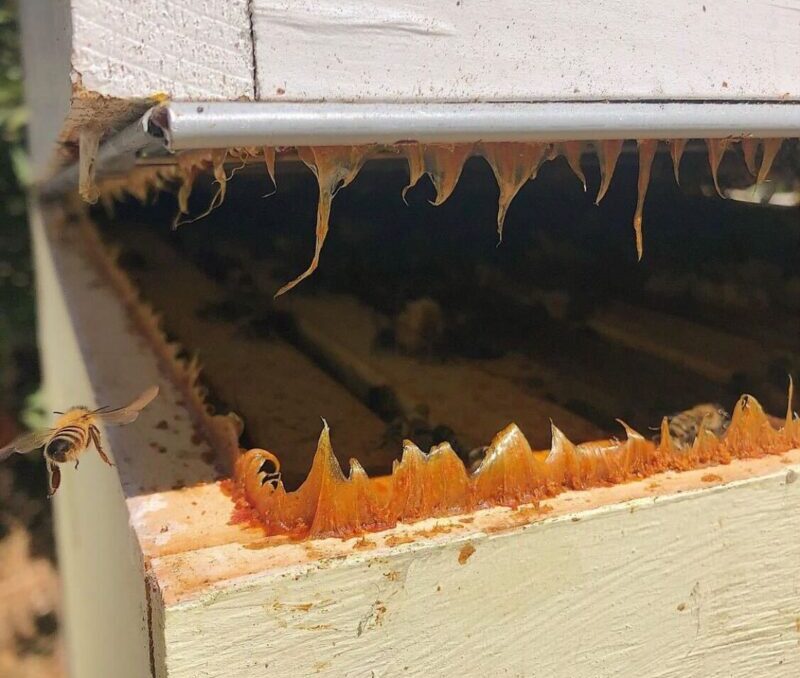
Well kept treasure of Propolis. Benefits of beeswax or so called "bee glue"
Share
Now in this bee journal blog page we’re highlighting propolis, the sticky, waxy substance formed by the combination of tree sap and beeswax that bees use to build and maintain their hive.
Long valued for its use from the ancient times, it features a natural composition of many benefits, including antibacterial, antiviral, antifungal, anti-inflammatory properties.
Propolis also contains important vitamins, such as vitamins B1, B2, B6, C, and E and minerals such as magnesium (Mg), calcium (Ca), potassium (K), sodium (Na), copper (Cu), zinc (Zn), manganese (Mn), and iron (Fe).
What is Propolis and how it is made by bees?
The word “propolis” has its origins in the Greek language. Pro- means for, or in front of, and -polis means the city; it’s aptly named, as propolis is used to protect the “city” of bees. Resins from plants and trees are mixed with beeswax to create propolis: a malleable, waxy substance that is used to smooth rough surfaces and seal any holes or gaps in the hive. This allows the colony to control airflow and maintain homeostasis.
Propolis has been found to have antimicrobial properties; it plays an important role in the hive’s ability to fight off infection and diseases. In making propolis, the bees are essentially utilizing the immune system of trees for their own collective health. When a colony is sick, the bees collect extra propolis to bolster the hive. In this way, propolis use by honey bees can be considered an example of social immunity: a collective behavior that benefits the health of the colony as a whole.
Aside from pollen, nectar, and water, honey bees also collect resins from the cracks in the bark of trees and leaf buds. Once the pollen baskets on the bee’s hind leg gets full, she will fly back to the hive where propolis removal is carried out. This resin is masticated, which adds the bees’ unique salivary enzymes to the substance. The partially digested material is then mixed with beeswax to produce the final product of propolis. So according to various scientific sources, such a product can contain about 180 various components. Wow!

What do bees use Propolis for?
Honey bees use propolis in the construction and repair of their hives – it’s used for sealing openings and cracks, smoothing out and waterproofing the internal walls, and strengthening the protective barrier against external invaders or weather.
Aside from simply acting as a kind of “glue” or cement for the hive, propolis plays an extremely important role in maintaining hive health. Propolis serves as a disinfectant of all surfaces in the hive. It is used as a natural antibiotic against microbial pathogens. Studies have found that propolis can be regarded as a natural pesticide used by honey bees to limit a dangerous parasites.
Benefits of Propolis for human wellbeing
In general, the benefits of Propolis can be described as anti-inflammatory, antimicrobial and as reducing oxidative stress. In terms of beneficial impact, propolis surpasses many plant-based preparations because its composition is much more rich and impressive. So, what is Propolis useful for?

Antibacterial and antiviral effect
Studies show that propolis can destroy viral RNR before it enters a cell, thereby preventing the reproduction of the virus. This effect was observed with various viruses, including different strains of the Herpes virus. In these studies, various types of widespread bacteria such as Staphylococcus, Streptococcus, E. colli and others also failed to resist the antibacterial effects of propolis. The operational principle of propolis is relatively simple: it dismantles the bacteria’s wall and part of its cytoplasm, thus disrupting protein synthesis, which means that the bacteria can no longer reproduce.
Fungicidal effect
The fungicidal properties of propolis were observed in studies of common pathogenic yeasts, Candidiasis and other pathogenic fungi. The polyphenols and other active components of propolis interrupt the reproduction of the fungus through its spores, preventing its spread. They also contribute to wound healing.
Anti-inflammatory properties
Because of the flavonoids contained within it, propolis acts as an anti-inflammatory. Once they enter the source of inflammation, the active components inhibit the inflammation and stimulate healing processes.
The scientists went on to say that their results clearly demonstrated that propolis may be effective in the relief of symptoms of allergic rhinitis through inhibition of histamine release.
Disease-fighting effect. Much like other bee products, propolis has properties that interrupt the growth of diseases. Another health benefit of propolis appears to be that it helps to build and maintain healthy bone tissue.
Protects the liver
Propolis has been shown to have hepatoprotective effects, which means it can protect the liver from damage caused by toxins, drugs, or other harmful substances. It can also help reduce inflammation in the liver and improve liver function. Some studies have suggested that propolis may be helpful for treating liver diseases, such as hepatitis and fatty liver disease. It has also been observed to help protect liver cells from the toxic effects of mercury and to reduce oxidative stress.
Antioxidative benefits
Propolis, like other antioxidants, interrupts the accumulation of free radicals. Because free radicals are closely linked to ageing and cell damage, propolis can help delay the progression of various free radical-related diseases. It also supports red blood cell counts by reducing the lipid peroxidation processes within the red blood cells. Some studies suggested that propolis may support hearth health by normalizing blood pressure.
While more studies do need to be done, it is possible that the administration of propolis reduces the accumulation of body fat while improving lipid metabolism resulting in reduced cholesterol.
Radiation protection effect
Studies suggest that one of the many bee propolis health benefits is also a radio protective effect. We are all exposed to radiation on a daily basis now due to the countless cell phone and satellite signals that surround us. It would be beneficial to take propolis on a daily basis in order to help protect the body from this excess radiation.
Digestive health and immune system benefits
A variety of studies have shown that propolis has antiseptic, antibacterial, antifungal, antiulcer, antioxidant, anti-inflammatory, and immune-modulating properties, which often work through the intestinal microbiota! Propolis has antifungal activity against pathogenic yeasts and parasites.
In a study, it was found that Propolis has the ability to strengthen the gut functions, leading to less 'leaky gut.'
Wound healing
Propolis stimulates the accumulation of collagen and other wound-healing components at the wound site, while decreasing numbers of free radicals that work against wound healing. It improves blood circulation as well as various enzymatic processes that help tissue regenerate faster. In addition to all this, it also helps wounds heal by preventing the reproduction of various microorganisms. The consumption of propolis can help heal both external and internal wounds and have anti-aging effects.
By observing the independent nature of bees, how they create products for themselves to ensure all necesarry living functions, we can see how every product holds great value. The Propolis being the substance for protection and disinfection, holds many essential benefits also for human health.
Try and discover these benefits by yourself. You can find Propolis, along with superfoods like Bee Bread and Royal jelly in our unique, easy to use, 100% natural BeeGold supplement here.
- the SuperBee


